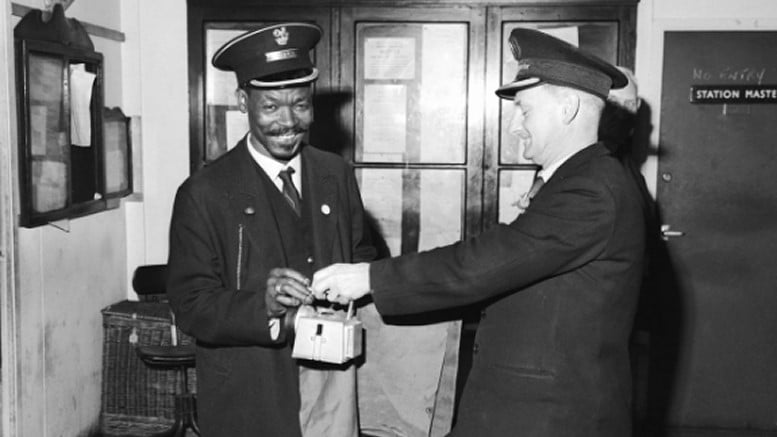
Monday 15 August 1966 was a significant day in terms of race relations on Britain’s railways. It was the day that Asquith Xavier started work as a guard at London Euston station.
Asquith Xavier was 46 and had come to Britain from Dominica, the largest of the Windward Isles in the eastern Caribbean. He had started work for British Railways in 1956 as a porter, working his way up to rail guard at Marylebone station.
While there was no colour bar at Marylebone, there was at Euston. As far back as 1961, a British Railways Western region staff officer told press: “All things being equal, we prefer taking on white people… they are preferred to coloured people for reasons of intelligence and education.”
As a result, in June 1961, the Communist Party newspaper The Daily Worker reported that the South Paddington Labour Party had asked British Railways to investigate immediately the ban on employment of coloured workers at Paddington Station.
However, when Asquith Xavier, already an experienced guard, applied for a job at Euston five years later, he received a letter telling him that he had been rejected for a job at Euston because of the ban on coloured men.
James Prendergast, a National Union of Railwaymen official at Marylebone, took up the case and, as a result, British Rail announced that no grade would, in future, be closed on racial grounds anywhere in the London division.
Asquith Xavier started work on 15 August 1966, though he reportedly asked the company for protection.
Although the Race Relations Act had come into force in 1965, the first legislation in the United Kingdom to address racial discrimination, it only made it a civil offence to refuse to serve a person, to serve someone with unreasonable delay, or to overcharge, on the grounds of colour, race, or ethnic or national origins. It also created the offence of ‘incitement to racial hatred’.
It wasn’t until 25 October 1968 that a revised version of the Race Relations Act made it illegal to refuse housing, employment, or public services to a person on the grounds of colour, race, ethnic or national origins. So, Asquith Xavier and the National Union of Railwaymen were two years ahead of the legislation that would protect workers in future.

Senior assistant general secretary Mick Lynch of the RNMT, successor to the NUR, said: “Today we remember the brave actions of Asquith Xavier and those NUR officials who supported him in a campaign which eventually defeated the colour bar at Euston station. We owe so much to those who challenged racism on the railway in an era when it was all pervasive.
“The union remains eternally vigilant in the fight against racism and in this modern era of Black Lives Matter it is important we remember Asquith Xavier and those trade unionists who blazed a trail for us over five decades ago.”


1 Trackback / Pingback